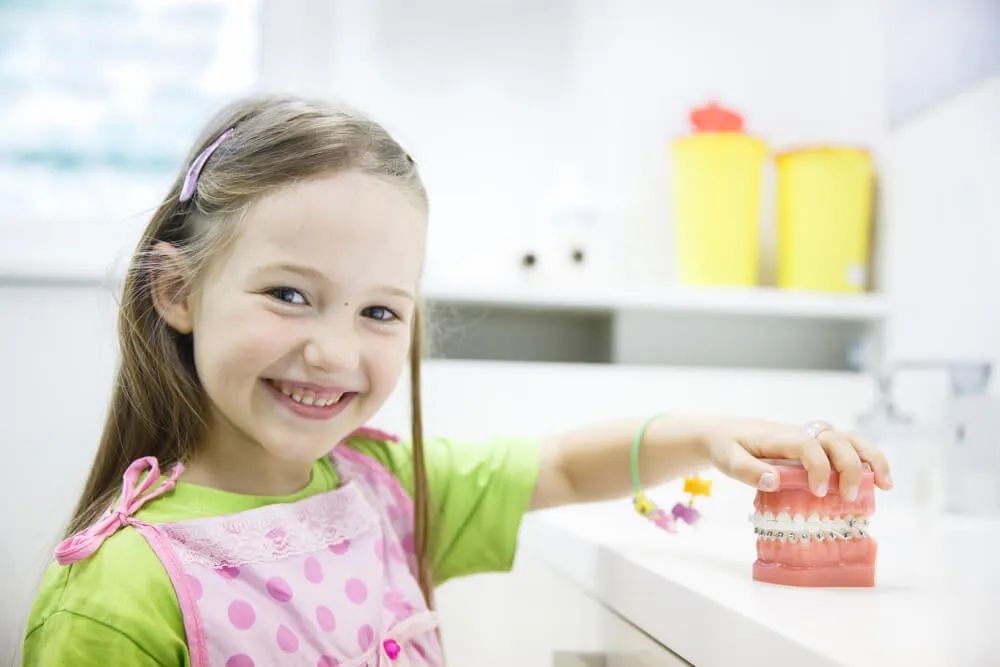The first dental examination for children should be done at approximately 1 year of age, after the eruption of the first milk tooth. It is recommended that this examination should be performed by a pedodontist. The most important reason why the first examination is so early is to transfer brushing and feeding habits to the parents correctly. Early childhood caries (ECC / nursing bottle caries) starts exactly at this age. After that, a doctor’s control every 6 months is very valuable to prevent caries or a possible problem before it occurs because preventive treatments occupy an important place in pediatric dentistry. In this way, since the problems can be intervened before they grow, a fear of dentistry that may occur in children is prevented.
While giving general information to the parents at the first dental examination, it is important to comfort the children by explaining which tools are going to be use during treatment and how they work. This approach of pedodontists enable children to overcome their fear of dentistry or even to completely disappear and to feel safe.
All necessary treatments and protective practices should be performed under general anesthesia by directing the parents of children who require special attention (who have a strong fear of the dentist, disability, etc.). It can be applied at any age, from the age when teeth first emerged.
With regular controls, it becomes easier to follow the growth and development stages. By making skeletal arrangements, aesthetic, phonetic and psychosocial problems that may be encountered in the future are prevented. In some cases, parents and pediatric patients should be advised to quit bad habits (Finger sucking, Palate sucking, Nail biting, Pen biting, etc.) as they could deflect skeletal development.
After dental trauma, multifactorial evaluations should be made and the treatment of primary and permanent teeth should be completed with correct indications. For this, pedodontists should be consulted immediately after the trauma. It should be noted that dental trauma injuries are more common in children than in adults.
While performing the treatment of primary and permanent teeth (restorative and endodontic) in children, preventive applications must added to the treatment planning by determining the caries risk group of the children. Some preventive pedodontic applications are as follows:
Fissure sealant (Tooth polish)
Temporary (primary) and permanent teeth are very prone to caries formation as they do not complete the enamel formation when they first erupt.
Since food accumulation in the recessed and protruding structures (fissures) on the chewing surface of the teeth that will cause very rapid caries formation. Therefore a protective sealant must be applied to these surfaces. With the method called fissure sealant (dental nail polish), these surfaces are covered with a fluid filling material. The tooth becomes strong against caries stimuli.
Fluorine applications
Fluorine is a very important element that prevents tooth decay and strengthens the structure of the tooth by joining the structure of the tooth. Newly erupted permanent or primary teeth are very sensitive to cavities as they have not yet completed their enamel formation. Fluorine strengthens the tooth structure against caries. With this method applied by pedodontists, future dental caries can be prevented before they start.
Space Maintainer
Primary teeth are also very important because they take up space for the permanent teeth that will come from below, apart from the eating-drinking function of children. In the early loss of a possible primary tooth, the teeth slide forward, closing the place of the permanent tooth that will come from below. This creates a crowding problem in the future. For this reason, in the early loss of a primary tooth, a space maintainer must be made to cover the place of that tooth.
These space maintainers can be fixed or removable depending on the location and the number of the lost primary tooth.
Thumb & Finger Sucking Sucking Habit
If the habit of thumb sucking, which starts at a young age in children, is not stopped after a certain age, it causes permanent tooth and jaw problems. In these cases, treatment alternatives are available. First of all, the child should never be approached with anger, instead of punishing, this problem should tried to be prevented with affectionate speeches. If the thumb sucking habit continues, intraoral appliances can be a treatment approach.



